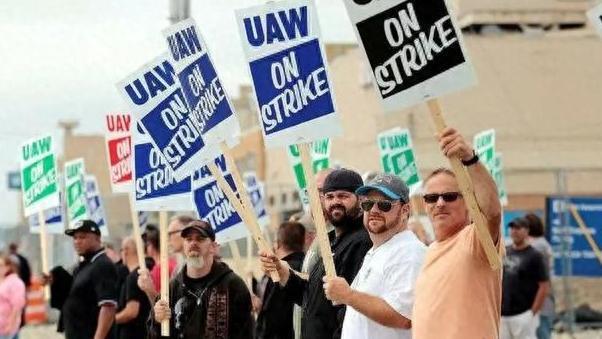
Recently, Starbucks and Volkswagen, two globally renowned companies, have been plagued by employee strikes. The strike at multiple Starbucks stores in the United States continues to escalate, with employees demanding improved working conditions and salary benefits; Volkswagen employees also went on strike again, opposing the company's cost cutting plan. These two incidents not only reflect the complexity of internal management in enterprises, but also reveal the tense relationship between employee rights and enterprise development in the current economic environment.
Starbucks, as a globally renowned coffee chain brand, has a large number of stores and a large workforce in the United States. However, in recent years, Starbucks' issues in salary, staffing, and scheduling have gradually become prominent, causing dissatisfaction among employees. The trigger for this strike was the deadlock between employees and Starbucks in salary negotiations. The Starbucks Workers United union planned this action, taking place a few days before Christmas Eve, which is an important sales period for Starbucks. However, the employees chose to launch a strike at this critical moment to protest the company's failure to present sincere economic proposals.
Starbucks stated in a statement that the union's proposal calls for an immediate increase of 64% in the minimum wage for hourly workers and a total increase of 77% over the three-year contract period. Starbucks believes that this approach is unsustainable and emphasizes that the company has invested over $3 billion in the past three years to enhance the work experience of its employees, offering competitive average wages, an hourly wage of $18, and top-notch benefits. However, due to Starbucks' poor financial performance, many employees only received 60% of the total bonus for the most recent fiscal year this year, which means that compared to previous years, Starbucks employees' bonuses have decreased by nearly 40%. This news not only disappointed the employees, but also raised concerns about Starbucks' future development from the outside world.
Behind the Starbucks employee strike is a profound contradiction between employee rights and corporate profits. In the current economic environment, enterprises are facing dual pressures of cost control and profit growth. However, employees hope to receive better salary and working conditions. This contradiction is particularly prominent in chain enterprises like Starbucks, as they often need to maintain efficient operations and low costs to maintain their market competitiveness. However, this pressure is often passed on to grassroots employees, resulting in an increased workload without corresponding salary increases.
At the same time, Volkswagen has also been plagued by employee strikes. Similar to Starbucks, the strike at Volkswagen was also triggered by employees' dissatisfaction with the company's cost cutting plan. In order to cut costs, Volkswagen plans to close at least three local factories in Germany and lay off tens of thousands of employees. This plan has sparked strong opposition from employees, who are concerned that their jobs will be threatened as a result.
The predicament of Volkswagen reflects the severe challenges in the current automotive industry. With the intensification of competition in the electric vehicle market and the increasingly tense economic situation, weak demand, high costs, and lagging transformation are dragging down the performance of established European automotive companies. In order to maintain competitiveness, Volkswagen had to take cost cutting measures. However, this measure directly conflicts with the interests of employees. Employees are concerned that layoffs and factory closures will result in them losing their jobs, while the company hopes to reduce operating costs and improve profitability through these measures.
In the case of Volkswagen, we can see a profound contradiction between corporate reform and employee interests. Enterprises often need to take painful reform measures to cope with market competition and cost pressures. However, these measures often have a direct impact on employees, leading to threats to their work and life. In this situation, how to balance the interests of enterprises and employees has become an urgent problem to be solved.
The strikes at Starbucks and Volkswagen not only reflect the complexity of internal management, but also reveal the tense relationship between employee rights and corporate development in the current economic environment. In the current economic situation, enterprises are facing enormous competitive and cost pressures. In order to maintain competitiveness, companies often need to take cost cutting measures. However, these measures often have a direct impact on employees, leading to threats to their work and life.
At the same time, employees also hope to receive better salary and working conditions. They hope that their labor can be rewarded appropriately, and at the same time, they also hope to have more autonomy and dignity in their work. This demand is particularly urgent in the current economic environment.
In short, the strikes at Starbucks and Volkswagen provide us with a window to observe the tense relationship between employee rights and corporate development in the current economic environment. When facing these challenges, we need to consider how to balance the interests of enterprises and employees in order to achieve sustainable development and social harmony.

The U.S. third-quarter GDP growth rate, strikingly highlighted at 4.3%, not only surpassed market expectations but also earned the label of "the fastest in two years."
The U.S. third-quarter GDP growth rate, strikingly highligh…
Recently, US personnel intercepted a "Century" super oil ta…
According to Xinhua News Agency, the subtle changes in the …
The rapid development of artificial intelligence has brough…
In December 2025, Taiwan's political scene was shaken by a …
When Apple appears for the Nth time on the list of penaltie…